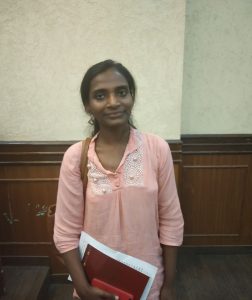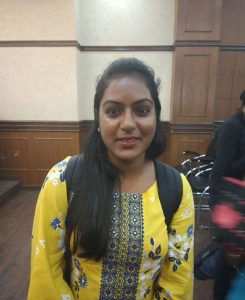Haleema Khan, from Delhi’s Seemapuri, recalls her school days when some of her friends would be reluctant to share food with her. “During lunch break, my Hindu friends would always ask if my mother cooked my meal in the same pan she used to cook non-veg for dinner the night before.”
Years later, Khan – now a teacher – says that things haven’t really changed in schools and other educational institutions. “I don’t understand why everyone is so obsessed with what we [Muslims] eat,” she said.
However, she has devised an interesting trick to dispel the hatred. Once a week, her students share lunch with each other. They call it “Chatpata din“.

Social activist and teacher Haleema Khan. Image credit: Livewire.
Khan managed to break the taboo around what constitutes “good food” and “bad food” by explaining to her students how food is only meant to fill one’s stomach, not to draw lines of divisions.
She works with a Delhi-based not-for-profit organisation where she educates girls who drop out of school due to financial and social reasons.
Besides, she also ensures that nobody in her class faces discrimination of any kind. “We celebrate Diwali and Eid with equal fervour so that students get to know about each other’s culture and social context,” she added.
Khan is not the only one who has been working at the grassroots level to empower women and combat hate and violence.
Muslim women activists from across ten states, on March 27, came together in New Delhi to share their stories of how they’ve tried to overcome hate and violence against women.
Some of them also spoke about the issues faced by other minority groups like the Dalits and the Adivasis.
Moreover, they used this gathering as a platform to forge their demands for the upcoming Lok Sabha elections.
Saba Khan – an active member of Bhopal Mahila Manch – provides legal as well as psychological support to women who are sexually harassed by the police in Bhopal and parts of Chhattisgarh.
Also read: How Teenage Girls Overcame Backlash From Within their Communities
She believes that in past five years, women in minority groups have been victims of sexual assault more than any other group.
Hence, she helps the survivors by spending time with them and teaching them how to address their trauma and fight for themselves.
“When you speak to these women calmly, they come out and respond without any hesitation. At the end of the day, no matter how bad the situation is, each one of us wants to stand up for what is right and condemn what is wrong,” she said.
Saba and her organisation also ensure that every case is followed-up with until the end. “We never leave a case in the middle and put in every possible effort to ensure that justice is neither delayed nor denied,” she added.

Saba Khan is a member of Bhopal Mahila Manch. Image credit: Livewire.
However, Saba believes that the death penalty – as is proposed by the current government – is not the solution to the ever-increasing instances of sexual assault faced by minority groups.
According to her, it does no good to the survivor and neither does it solve the problem because harassment continues regardless.
Towards the east in Assam, Rehna Khan, a freelance social activist, voluntarily helps women who are tortured by security officials whenever the National Register of Citizens (NRC) is updated.
As per Rehna’s observations, Muslim women have been most affected by the new directive.
“A pregnant woman in Assam who protested against it [NRC] was hit so hard on her stomach that she had to give birth to her child on the road,” said Rehna.
She described another incident where a woman’s child died while she was standing under the scorching sun, waiting to get her documents verified for the NRC.
In light of these incidents, Rehna regularly visits different official centres to help people with the whole process and make them aware of the government’s exclusionary measures against the Muslim community.
“Many women are not literate and aren’t aware of the procedure, which often leads to the incidents I mentioned earlier. Hence, I help them find documents and make sure the authorities don’t torture them in any manner,” said Rehna.

Assam-based freelance social activist Rehna Khan. Image credit: Livewire.
The women activists released their manifesto – demanding laws to ban communal hatred, provide equal educational and employment opportunities to Muslim women and rollback the Triple Talaq Bill which, according to them, criminalises Muslim men.
The poster behind them read: “Nafrat Ke Khilaaf, Bekhauf Elaan (Our manifesto against the hate)”
They signed off saying that no matter which government comes to power, they shall continue to fight against hate.

